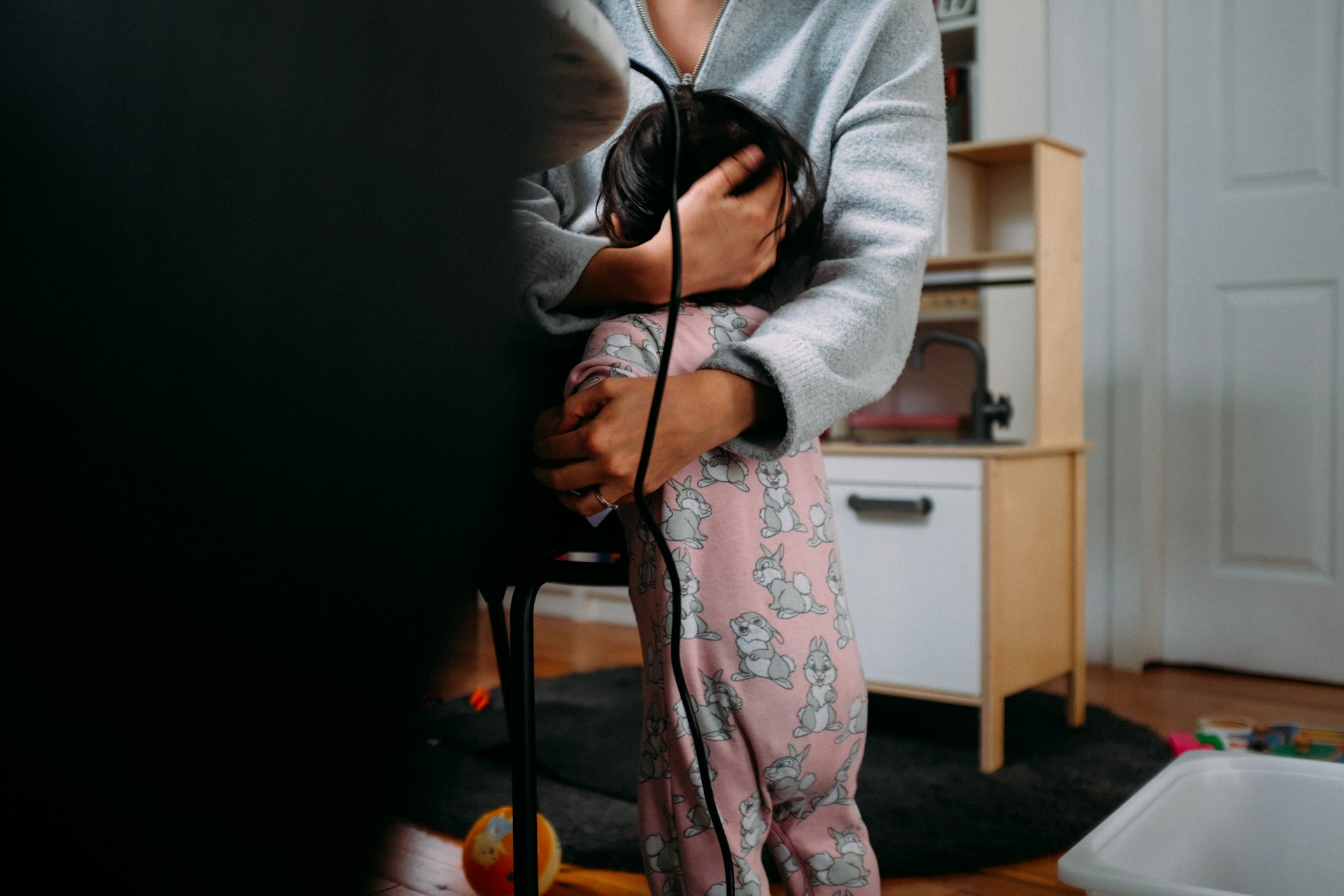 Divorce is hard. Sometimes in an effort to protect ourselves from the hurt and pain, we inadvertently dismiss what the children of divorce think or feel. Or, we believe them when they say they don’t want to talk about the divorce or that they don’t care. We want to believe that they will come out of this all right.
Divorce is hard. Sometimes in an effort to protect ourselves from the hurt and pain, we inadvertently dismiss what the children of divorce think or feel. Or, we believe them when they say they don’t want to talk about the divorce or that they don’t care. We want to believe that they will come out of this all right.
The truth is that divorce affects every member of the family. It’s important to be open and honest with your child, but also watch out for any signs that they are having difficulty accepting the new living arrangements. If your child is having trouble, it might be time to enlist the help of a professional therapist.
Speaking to Children of Divorce
There can be multiple reasons why the communication breaks down between parents and children amid a divorce. It could be that talking about the divorce is too upsetting to the parent, so they simply tell their child in a brief statement about divorce. It could be that the child is hurt about the divorce but doesn’t want to admit it.
Children of divorce sometimes shrug off the situation to keep their emotions at arm’s length. They may feel betrayed and decide that it is better to distance themselves to keep from getting hurt again. Other children may blame themselves for their parents’ inability to cohabitate.
Whatever the reason, you can prevent miscommunication by talking openly to your child about the forthcoming changes before the separation, if possible. If you can, schedule a time when both parents can sit down with the child and explain the new arrangements. There is no need to go into detail about why the decision was made, but reiterate that both parents love the child.
Of course, sitting down with the other parent before the divorce is ideal, but not always possible. In some cases, the other parent has moved away or is a danger to the child. You will need to try to communicate with your child that the new change will benefit the family in the long term.
Don’t try to talk with them about the divorce before going to school or daycare. Pick a quiet time when it is just you and the child(ren), possibly the beginning of a weekend. To monitor how well your child is doing during the divorce, consider confiding in your child’s teacher, school counselor, or daycare instructor before telling your child. These people can alert you to any changes in behavior.
 Just like your emotions while coping with divorce, your child’s emotions will be all over the place. They may cycle from hurt and worry to resentment and anger. Allow them to express their feelings but reassure them of the things that will remain the same.
Just like your emotions while coping with divorce, your child’s emotions will be all over the place. They may cycle from hurt and worry to resentment and anger. Allow them to express their feelings but reassure them of the things that will remain the same.
For example, if they are to remain in the house with one parent, let them know that they will not be moving their things out of the house. If one parent takes them to movies every Sunday afternoon, let them know if that tradition will continue. If not, tell them about the change as soon as you can. Knowing ahead of time will help your child cope with the transition a little smoother.
Is Your Child Coping with Divorce Well?
How can you tell if your child is surviving divorce well or taking it hard? When should you think about bringing in a family therapist?
There are several signs that your child is having difficulty with the divorce:
- Your child has lost interest in hobbies, games, and friends. Often, children can develop depression during and after their parents’ divorce. This can also result in physical ailments such as headaches and stomach issues.
- Your child’s grades drop in school or they begin behaving differently in class. If your child is normally a high achiever, they may suddenly lose interest in trying. Or, if your child is very talkative, they may refuse to answer questions or socialize with their peers.
- Your child regresses in certain behaviors. It’s common for children under stress to wet the bed during the night or suck their thumb to comfort themselves. Older children may want to cling to you or another relative they are close to, like a grandparent.
- Your child refuses to speak with or be near one parent (and abuse is not a factor). Children can feel that they must choose which parent to live with or which parent to believe. This is common with messy divorces.
- Your child’s sleep patterns change, or sleep disorders emerge. Your child may have trouble falling asleep or staying asleep. Some children develop night terrors in response to stress and insecurity.
- Your child’s eating patterns change, whether overeating or undereating. Eating disorders can emerge when a child believes the only thing they can control is the amount of food they consume or how they can rid their body of the food.
- Your child develops anxiety or panic attacks. The constant worry can lead to anxiety and physical panic attacks that come on suddenly. These can leave your child feeling scared and short of breath.
- Your child’s behavior is negatively impacted. Your child may become unruly, aggressive, or sarcastic during this time. They may do things that they shouldn’t like breaking into a house or shoplifting. This behavior could be a way to express their hurt or to get your attention.
- You suspect your child is self-harming or suicidal. If your child is cutting, burning, or hurting themselves in any way, seek professional help. Even at the smallest sign of suicidal thoughts, call a licensed mental health provider.
Your child doesn’t have to show all these signs. If you feel they are struggling with the divorce, contact their pediatrician or request a referral for a counseling center. It could be that just a few sessions of family counseling are needed to get them back on track.
Adapting to Life After Divorce
 The upheaval from a divorce causes chaos. Yet, if you can try to maintain a routine with your child(ren), it will enable them to cope with the transition. This can mean sticking to a consistent bedtime routine for the younger child or keeping to the morning schedule for your teenager.
The upheaval from a divorce causes chaos. Yet, if you can try to maintain a routine with your child(ren), it will enable them to cope with the transition. This can mean sticking to a consistent bedtime routine for the younger child or keeping to the morning schedule for your teenager.
Impress upon your child that you are available to talk, but don’t push them into a conversation if they are not ready to share. If possible, try to include the other parent in some of the bigger decisions, such as the age when the child is mature enough to get a driver’s license. If both parents share a united front throughout the child’s life, even though they are no longer married, the child will feel they have your support.
Never blame or bad-mouth the other parent in front of your child(ren). Children notice more than we realize. If you need to speak to someone about your former spouse, consult with them privately.
Christian Counseling for Children of Divorce
How does one go through a Christian divorce and still maintain integrity and family cohesiveness? As a Christian, you wouldn’t have come to the decision to divorce lightly. This is something that has been weighing on your mind for some time, and quite possibly for more than one reason.
 Learning to manage the emotions from the divorce and navigating around a new life can be difficult. You may want to seek the advice of a licensed Christian therapist who specializes in helping children of divorce. The therapist will most likely suggest family counseling sessions with you and your child(ren). If abuse has not been a factor in the divorce, they may recommend that the other parent also attend to help the child manage their feelings about both parents.
Learning to manage the emotions from the divorce and navigating around a new life can be difficult. You may want to seek the advice of a licensed Christian therapist who specializes in helping children of divorce. The therapist will most likely suggest family counseling sessions with you and your child(ren). If abuse has not been a factor in the divorce, they may recommend that the other parent also attend to help the child manage their feelings about both parents.
The therapist might also encourage individual sessions with your child and include different methods of therapy, such as talk therapy, art therapy, or play therapy. Your child is given the chance to express their feelings about divorce through these different mediums.
It is possible to survive divorce and thrive. But it is probably going to take a great deal of work to heal from the pain and grief. Let your child know you are there for them and open to their feelings.
“Longing”, Courtesy of Joel Overbeck, Unsplash.com, CC0 License; “Little Cutie”, Courtesy of Yousef Espanioly, Unsplash.com, CC0 License; “Washing Up”, Courtesy of CDC, Unsplash.com, CC0 License; “Mother and Children”, Courtesy of Benjamin Manley, Unsplash.com, CC0 License
-
Lisa Velin: Author
I’m a firm believer in the limitless possibilities for redemption through faith in Christ. I’m a Licensed Mental Health Counselor and Clinical Supervisor with extensive experience in bilingual counseling, and helping people work through anxiety, depr...
-
Kate Motaung: Curator
Kate Motaung is the Senior Writer, Editor, and Content Manager for a multi-state company. She is the author of several books including Letters to Grief, 101 Prayers for Comfort in Difficult Times, and A Place to Land: A Story of Longing and Belonging...
DISCLAIMER: THIS ARTICLE DOES NOT PROVIDE MEDICAL ADVICE
Articles are intended for informational purposes only and do not constitute medical advice; the content is not intended to be a substitute for professional medical advice, diagnosis, or treatment. All opinions expressed by authors and quoted sources are their own and do not necessarily reflect the opinions of the editors, publishers or editorial boards of Stone Oak Christian Counseling. This website does not recommend or endorse any specific tests, physicians, products, procedures, opinions, or other information that may be mentioned on the Site. Reliance on any information provided by this website is solely at your own risk.







